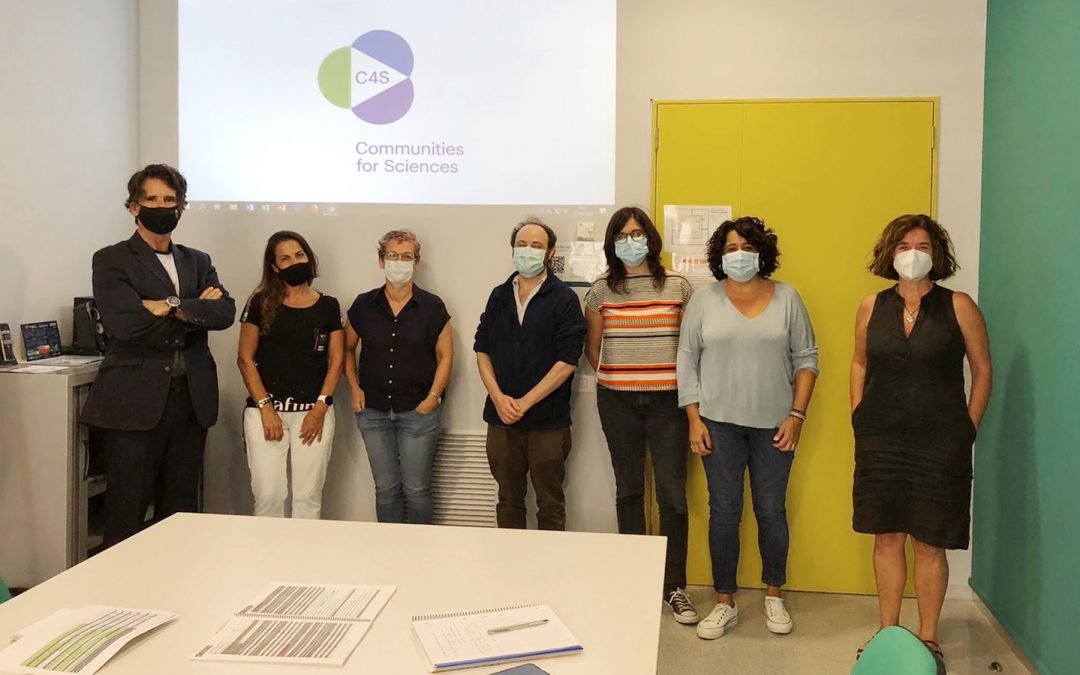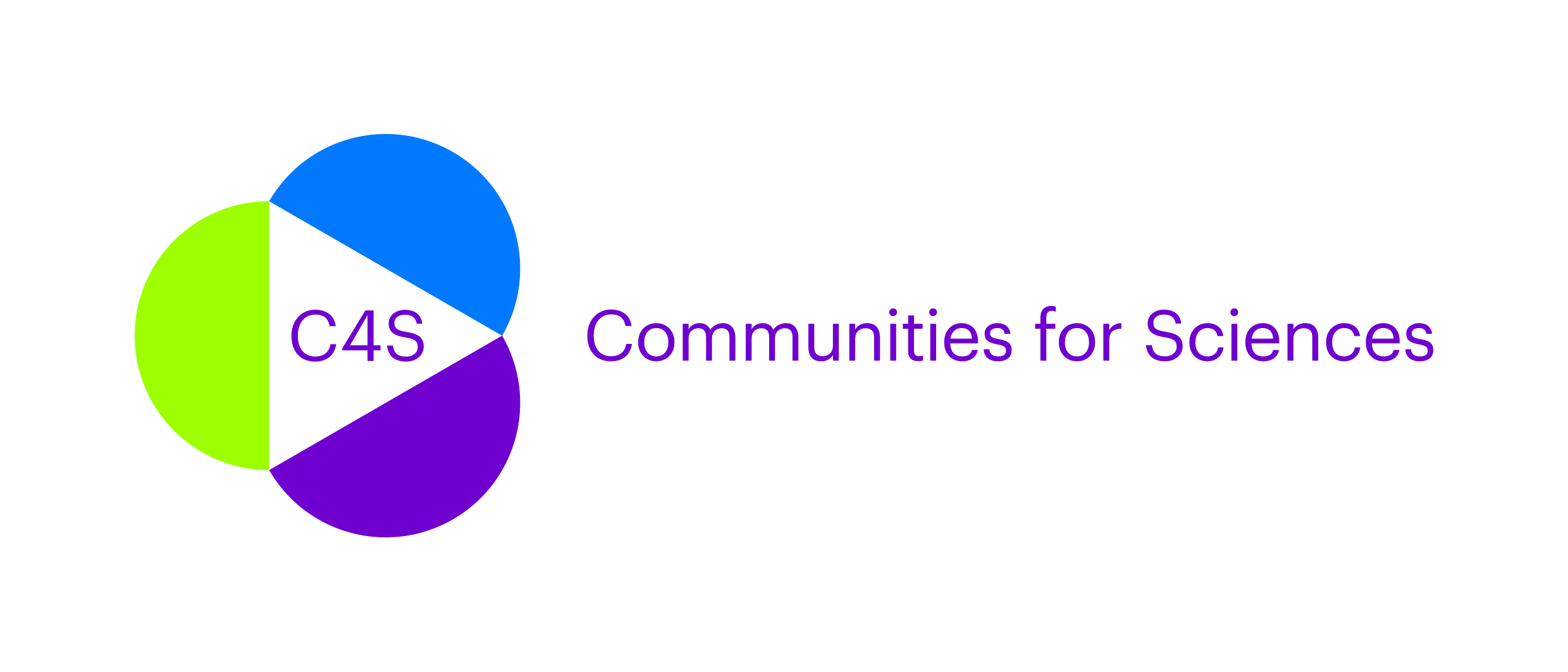
“Inclusive science is a science for, from and in favour of society”
Interview with Salvador Simó, Berta Vila and Francesca Davoli from Vic Campus (UVic-UCC)
Science education is one of the essential tools for advancing the social and cultural inclusion of children and young people. This is the main pillar on which the project “Communities for Sciences – Towards promoting an inclusive approach in science education” (C4S) is based, whose principal aim is to make science education more inclusive.
.- In a few words, how can we define inclusive science?
This is a science for, from and in favour of society: a science which excludes nobody on the basis of gender, age, race, sexual orientation, etc.
Like any other fields of knowledge, science must be accessible to everyone. The idea that there are “scientific minds” or “artistic minds” or subjects that are impossible for some people, is not true. This has been shown by neuroscience in recent publications or as demonstrated by Gómez-Motilla, C. and Ruiz-Gallardo, J. R. (2016)[1] in their study regarding gender issues which affect the interest in science in early childhood education. Therefore, science must be considered as a tool of inclusion and equity, in the sense that it allows the mind, the person and their intellectual autonomy to be developed.
From the field of research, we must move forward to place science in an inclusive, two-way paradigm. The first way is to increase the access which everyone has to science. The second one is to give visibility to minority groups, which are sometimes excluded, and to consider them as relevant scientific references.
.-What is the scope of the UVic-UCC Hub within the Communities for Sciences? How will the knowledge generated positively affect the development of the project?
On the one hand, we will work to prepare primary school children (from 6 to 12 years old) for an Economy 4.0, a term that economists have also coined as the Fourth Industrial Revolution, a period in which we are already immersed. This is based on new technologies such as 3D printing or virtual / augmented reality as well as robotics.
One of the consequences of Economy 4.0 is the disappearance of millions of traditional jobs and the emergence of new employment niches based on this new economy. In this sense, people who do not have technological skills will be excluded from this new job market and, therefore, will be in danger of social exclusion.
Our programme is based on generating knowledge on how to prepare school children in a situation of marginalization to meet the challenges of Economy 4.0 despite currently not having access to these skills.
In the field of early childhood education, it is a matter of taking a different approach to the current one. In some preschool classrooms, science is often a sporadic and residual activity, although it is known to develop very relevant cognitive activity.
Both in the first cycle (children aged 0-3 years old) and in the second one (children aged 3-6 years old) students, and especially their families, must perceive that they are perfectly capable of doing science and thinking scientifically.
Our programme seeks to develop the socio-cognitive skills of all girls and boys, and to share with their families this perspective concerning the possibilities of their children. Access to knowledge and a positive self-image guarantee equality.
The objective is to facilitate the development of critical, analytical, creative and autonomous thinking. This part of the project will serve as a scaffold for the first one, as they will be interconnected.
.- What are the greatest challenges you are facing?
There are many different challenges. On the one hand, the importance of raising awareness in the families of young children that working with them and their children is of paramount importance and that science can be a factor to foster inclusion and awareness.
On the other hand, the difficulty of reaching a large group. Luckily, the project covers many institutions, both national and international, and is three years long, which makes it transversal. However, research only makes sense if it is outreaching and has a positive effect on society. This part is covered in this project, but it is always a complex task to reach different schools and especially the families, some of whom are not at all close to academic fields.
Inclusion, a theoretically accepted concept, is a challenge in itself because we are in the process of implementing the idea of schools belonging to and aimed at everyone, as prescribed by the new Decree 150/2017, of 17th October, on education for students within the framework of an inclusive educational system [2].
In fact, according to Stainbak (2001)[3], inclusive education is a process through which all children, regardless of ability, race or any other difference, are offered the opportunity to become members of ordinary classrooms and learn from and with their peers, in the classroom, all together.
It also alludes to aspects of social exclusion concerning children who do not have the technological skills needed for an Economy 4.0. This reality condemns them to unemployment or precariousness in the context of an Economy 4.0.
.- This is the first time that the two UVic-UCC campuses, UVic and UManresa, have joined forces to take part in a European project of this nature. What are your expectations for this new experience?
We believe it will be a great two-way learning experience shared with all the participants, which will help strengthen our UVic-UCC University Federation.
Working closely for three years with many other international ‘partners’, who bring different perspectives and backgrounds, will allow us to delve deeper into some current educational issues at a European level, as well as being able to improve the educational level of various countries. It will be very advantageous to weave this network of collaborations, not only within our own territory, but also with very different realities which are geographically far away. The cooperation with UManresa, which is leading the project, is a way to consolidate the relationship between the two campuses and to be able to guarantee and share the specific characteristics of each one.
This collaborative relationship will accompany us in the different phases of research in order to extend this inclusive scientific approach to other contexts and communities.
.- Do you have the support of other institutions? What means do you have?
The schools are our great allies. Obviously, without the teaching staff and the complicity of teachers and children, research is not possible. The families are equally important in this aspect.
Town halls must also be able to participate in the changes, be informed, collaborate and be co-responsible because, after all, education forms a part of politics. For this project we have the support of Vic Town Hall and the collaboration with different schools in the city: the Santa Caterina/Dominiques-Vic School, the Dr. Salarich School and the El Remei Municipal Family Centre.
In addition, we also have a wide network of teachers, educators and professionals in the field of education interested in research and investigation, who will provide us with support in the different phases and programmes which take place during the three years of the project.
The team is made up of UVic-UCC researchers, experts in the fields of education and social inclusion: namely, Francesca Davoli, Berta Vila and Mireia Canals (Faculty of Education, Translation and Human Sciences) and Salvador Simó (Faculty of Health and Welfare Sciences). The team will also be made up of other professionals who will collaborate on the project.
.- How do you envisage that C4S can contribute to promoting social inclusion through new technological opportunities?
Mastery of new technological skills will be the key for accessing the future job market, therefore it is essential to focus on the way they can be acquired from the preschool stage. However, inclusion is not just fostered through technology. Education is constructed through contexts, people and relationships, knowledge, skills and competencies and, consequently, value must be given to the actions and thoughts of each child, and their ways of learning. It is understood that this is the way to contribute to their own construction and development as a person in relation to the rest of the group, children and adults, teachers and families. From early childhood education to the other formative stages, if girls and boys are recognized as capable beings and accompanied by educators who believe in their potential, they will be able to develop those attitudes and skills necessary to grow and act in contemporary and future society. As Dr. Echeita succinctly attests, “Dreaming of inclusive education for everyone is not a utopia but a path to follow.”
[1] Gómez-Motilla, C., & Ruiz-Gallardo, J. R. (2016). El rincón de la ciencia y la actitud hacia las ciencias en educación infantil. Revista Eureka sobre enseñanza y divulgación de las ciencias, 13(3), 643-666.
[2] https://dogc.gencat.cat/ca/pdogc_canals_interns/pdogc_resultats_fitxa/?action=fitxa&mode=single&documentId=799722&language=ca_ES
[3] BRAY STAINBACK, S. “L’educació inclusiva: definició, context i motius”. Suports, 2001, vol.5, núm.1, p. 18-25.
